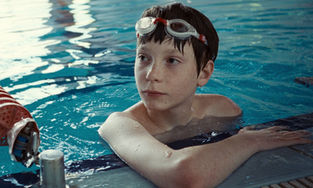'Finch' Review: Tom Hanks Builds Robots, Hoping To Build Friendships
- S.J.

- Nov 3, 2021
- 2 min read
Updated: Nov 3, 2023

Sometimes a name change doesn't feel all that necessary, as is the case with director Miguel Sapochnik's futuristic sci-fi adventure Finch, which went through said process before release. Tom Hanks plays the titular Finch, a lonesome inventor in this post-apocalyptic world, but the movie isn't merely about him or his journey since he builds an android, later named Jeff (mo-cap performance by Caleb Landry Jones), in order to give his dog Goodyear another companion because Finch himself is getting older. After Jeff begins to understand the life around him and how to protect and interact with Goodyear, three of them set their course to drive to San Francisco with hopes of finding more living resources and possibly other apocalypse survivors.
Title is notable in this particular instance because the film fights a couple different battles because of it: it's both way less catchy and detracting its main characters, plus the fact that it's a total crowd-pleaser (comparisons could be made to well-known animated hits, just imagine a live-action version of those) which could've been targeted towards families in theatrical field. Main storyline being about looking out for each other, what it is that you leave behind and why to keep going is really well-done by Sapochnik and writers Craig Luck and Ivor Powell. From the surface, it now looks like a sci-fi vehicle for Hanks who is really solid in the role, but not including Jeff (and Jones who is equally as good as Hanks) and a cute animal in Goodyear in the presentation can hurt the effect of those themes because of the expectations that you might have.
Even the colder and bleaker entrance to this apocalyptic world and then making the film more comedic and warmer works for the story, though there are moments that could've been cut to make Finch a really tight 90 or 100, like the teasing of action sequences that never really go anywhere. Slower moments in the first half also seem a bit odd because of the soundtrack which is really old-timey even for someone like Finch, and how the songs come in to and out from the scenes feature rough editing. Those problems don't extend visually as the visual effects—that not only have to re-imagine the surroundings but also make Jones' Jeff feel like he belongs—are really well implemented but they aren't used too egregiously to distract you from what's going on with the trio. Jo Willems' photography and Tom Meyer's production design take advantage of that as there's always enough to do in-camera as well.
Smileys: Story, tone, VFX
Frowneys: Minor issues with soundtrack
Don't move, don't even finch.










